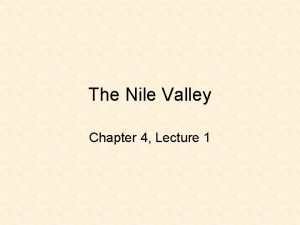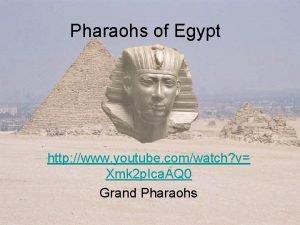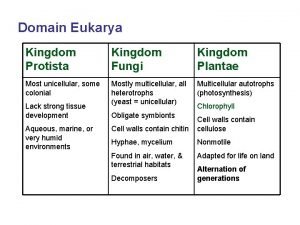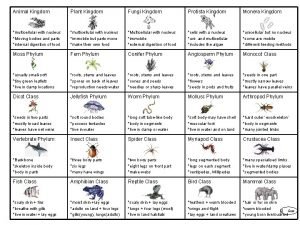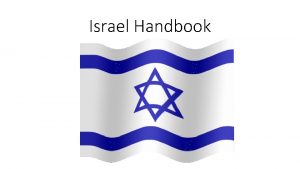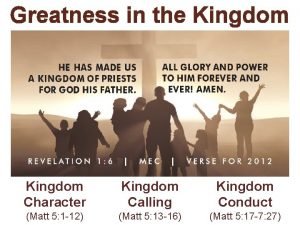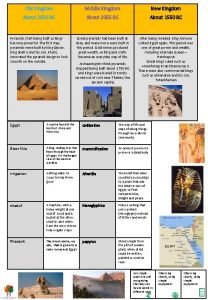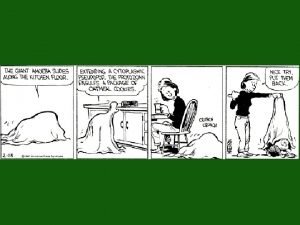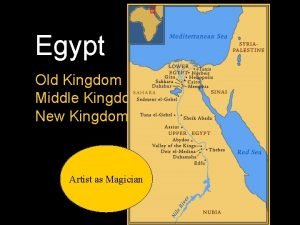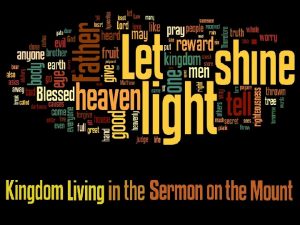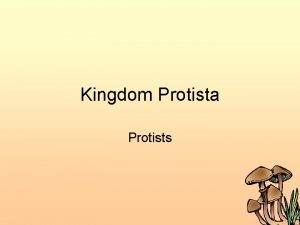The Kingdom of Israel The Kingdom of Israel




















- Slides: 20


The Kingdom of Israel • The Kingdom of Israel consisted of the ten tribes that broke away under Jeroboam. • This Kingdom of Israel lasted for almost 250 years under the reign of 19 kings belonging to 9 different families. All of these kings were idolaters.

The Kingdom of Israel • The overthrow of Israel by the Assyrians under Shalmaneser took place about 722 BC. • People were brought from different parts of the Assyrian Empire to occupy the country. • They turned to the worship of Jehovah mixed with their worship of idols. The Samaritans of the New Testament were descendants of this mixed race.

The Kings of Israel • During the history of the kingdom, there were 19 kings belonging to 9 families or dynasties. • Because of idolatrous worship, there was much violence. Seven kings met death by violence: Nadab, Elah, Tibni, Jeroram, Zachariah, Shallum and Pekahiah.

Jeroboam I • Israel's first king was a religious apostate. • Fearing a continuation of religious pilgrimages to Jerusalem, he made two calves of gold and set them up at Bethel and Dan. He founded a new priesthood and started popular pagan festivals. • In the 21 times that Jeroboam's name is mentioned, his apostasy is linked with it, "Who did sin, and made Israel to sin. "

Nadab • Nabad was Jeroboam's son and followed his father's bad example. He was murdered within two years.

Baasha • His name meant "wicked" and he was true to his name. To protect his throne, he massacred all the relatives of Jeroboam.

Elah & Zimri • Elah was a drunkard and was known as a "debauchee. " While drunk, Zimri who conspired against the king murdered him. • Zimri reigned only one short week for the people did not accept him. Zimri set fire to the palace and died in the flames.

Omri • Omri did worse than all the others that were before him (I Kings 16: 25). • Samaria now became the capital and sometimes the Northern Kingdom was called Samaria because of the capital.

Ahab • His father had arranged his marriage with Jezebel, a Phoenician woman. • Jezebel dominated her husband. • Baal worship was introduced and everything possible was done to destroy the worship of the one true God.

Ahaziah • During his reign, the Moabites successfully rebelled. • He fell from the lattice of his apartment and died after reigning two years.

Jehoram • During Jehoram's reign, the translation of Elijah took place. • He deeply respected the warning and miracles of the prophet Elisha. • The healing of Naaman and the overthrow of the Syrian hosts took place during his rule.

Jehoram • Jehoram was wounded in battle with Syria. • Jehu was anointed king by one of the sons of the prophets.

Jehoram • He set out for Jezreel and killed Jehoram on the very land Ahab had taken from Naboth. • He had Jezebel flung from a window and eaten by dogs.

Jehu • Throughout his 28 years of reign, Jehu was a bloody king. • He abolished the worship of Baal but allowed the worship of golden calves to continue. • His purge of Baalism created serious political problems with the Phoenicians. • He was forced to pay tribute to the Assyrian King.

Jehoahaz • Hazael of Syria reduced Israel to little more than the hill country of Ephraim. • Because of oppression, he prayed unto God for help and God promised deliverance, which came during his son's reign (II Kings 13: 4, 5).

Jehoash • He attacked Syria and regained the cities, which had been lost by his father. • He respected Elisha and paid respect to him during his final illness. • During the last years of his reign, he attacked Amaziah of Judah, plundering Jerusalem and the Temple and carried off palace treasures.

Jeroboam II • He was the son of Joash and the 13 th king. He regained the territory lost to the Syrians. • He reign was one of expansion and prosperity. • During his reign, both Amos and Hosea prophesied that Israel would be taken into captivity.

The Final Reigns • A state of anarchy followed the death of Jeroboam II. One king after another was murdered. • Hoshea was the last king.

The Final Reigns • Hoshea agreed to pay Shalmaneser, the Assyrian king, tribute. • After a time, the tribute was withheld and Hoshea looked to Egypt for help. • Shalmaneser invaded and ravaged the land. The Israelites were taken captive.
 Capital of egypt during the old kingdom
Capital of egypt during the old kingdom Old kingdom middle kingdom new kingdom
Old kingdom middle kingdom new kingdom Nnn ruled
Nnn ruled Old kingdom middle kingdom new kingdom
Old kingdom middle kingdom new kingdom Kingdom of israel
Kingdom of israel Plantae
Plantae Eukarya fungi
Eukarya fungi What is the odds and ends kingdom
What is the odds and ends kingdom Cool protists
Cool protists Thơ thất ngôn tứ tuyệt đường luật
Thơ thất ngôn tứ tuyệt đường luật Các châu lục và đại dương trên thế giới
Các châu lục và đại dương trên thế giới Từ ngữ thể hiện lòng nhân hậu
Từ ngữ thể hiện lòng nhân hậu Diễn thế sinh thái là
Diễn thế sinh thái là Vẽ hình chiếu vuông góc của vật thể sau
Vẽ hình chiếu vuông góc của vật thể sau Slidetodoc
Slidetodoc V cc cc
V cc cc 101012 bằng
101012 bằng Chúa sống lại
Chúa sống lại Lời thề hippocrates
Lời thề hippocrates Sự nuôi và dạy con của hươu
Sự nuôi và dạy con của hươu đại từ thay thế
đại từ thay thế

